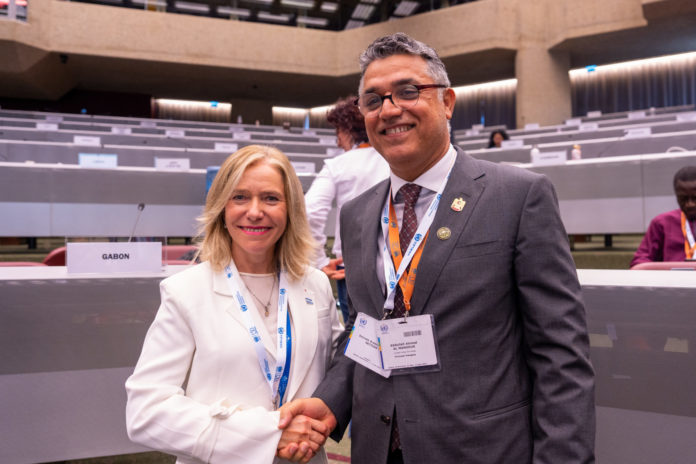L’Argentine Celeste Saulo a été élue Secrétaire générale de l’Organisation Météorologique Mondiale (OMM). Elle devient ainsi la première femme et première représentante du Sud, à prendre la tête de l’agence onusienne en charge de la surveillance du changement climatique et des phénomènes météorologiques. Du côté de l’élection présidentielle de l’organisation, c’est le représentant des Emirats Arabes Unis, Abdulla Al Mandous, qui a obtenu la majorité des voix. La nouvelle cheffe de l’OMM entamera son mandat de quatre ans le 1er janvier 2024.
Celeste Saulo, 59 ans, directrice du Service météorologique national de l’Argentine depuis 2014, et actuellement première vice-présidente de l’OMM a été élue dès le premier tour après avoir obtenu la majorité requise des deux tiers des voix des 193 membres durant le Congrès météorologique mondial.
Parmi les autres candidats au poste de Secrétaire général figuraient la Russo-Suisse, Elena Manaenkova, et Albert Martis originaire de Curaçao. Mais, ces dernière semaines la campagne a surtout fait rage entre l’actuel sous-secrétaire général, le chinois Zhang Wenjian et la ressortissante sud-américaine.
Grande expertise
La professeur Celeste Saulo a fait carrière dans le monde universitaire. Elle s’est particulièrement penchée sur le lien entre la recherche scientifique et les besoins de la société.
Au Service météorologique national d’Argentine, elle a encouragé des changements organisationnels importants, fondés sur une gestion qui vise des résultats concrets, répond aux demandes sociales. Ses recherches ont permis de mieux comprendre le système de mousson sud-américain et les schémas de précipitations et de circulation qui y sont associés pendant la saison chaude. Ces dernières années, elle a approfondi son activité sur des problèmes interdisciplinaires tels que la production d’énergie éolienne, les applications agricoles et les systèmes d’alerte précoce. Sa vaste expérience de l’enseignement est principalement liée à la prévision météorologique numérique, à la dynamique et à la thermodynamique de l’atmosphère, à la météorologie à méso-échelle, à la dynamique des nuages et à la microphysique des nuages.
Familiaire de l’OMM
Celeste Saulo est impliquée depuis longtemps dans les activités de l’OMM. En juin 2015, elle a été élue membre du Conseil exécutif de l’organisation. En avril 2018, elle a été élue deuxième vice-présidente et, en juin 2019, elle a été élue première vice-présidente, devenant ainsi la première femme à occuper cette fonction. Auparavant, l’argentine a été membre de plusieurs groupes d’experts scientifiques de l’OMM. Jusqu’en 2018, elle a été membre du Comité directeur scientifique du Programme mondial de recherche météorologique (PMRM). Elle a également fait partie du groupe de travail sur les prévisions saisonnières et interannuelles et du groupe d’experts PMRC/CLIVAR sur la variabilité des systèmes de mousson américains.
Président issu de la région du Golfe
Représentant permanent des Émirats Arabes Unis auprès de l’OMM depuis 2008, Abdulla Al Mandous est aussi Président de l’Association régionale pour l’Asie depuis 2017.
Membre du Conseil exécutif de l’OMM l’émirati a présidé le Groupe d’experts sur les cyclones tropicaux. Il est aussi membre du Comité permanent de météorologie de la Ligue des États arabes et du Conseil de coopération du Golfe pour la météorologie. Premier président issu de la région du Golfe, Abdulla Al Mandous occupe les fonctions de Président depuis jeudi 1er juin. Les Émirats Arabes Unis accueilleront la conférence des Nations unies sur le changement climatique (COP28) du 30 novembre au 12 décembre de cette année.
De nouveaux vice-présidents
Trois nouveaux vice-présidents ont également été élus. Il s’agit de Mrutyunjay Mohapatra, directeur du département météorologique indien désormais troisième vice-président de l’OMM, du directeur du service de météorologie irlandaise, Eoin Moran, qui occupe maintenant le poste de deuxième vice-président et c’est Daouda Konate, directeur de la météorologie de Côte d’Ivoire, qui a été choisi comme premier vice-président de l’agence pour les quatre prochaines années. L’ivoirien est président de l’Association régionale de l’OMM pour l’Afrique.
Une agence de plus en plus importante
Avec la lutte contre le réchauffement climatique, l’OMM a pris de plus en plus d’importance ces dernières années. Elle a aussi la charge du Groupe International d’Experts sur le Climat (GIEC) dont les experts indépendants lancent les évaluations qui alimentent la réponse de la communauté internationale face au réchauffement climatique.


